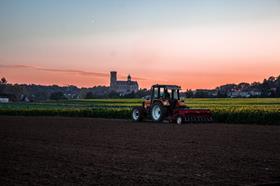
The UK government has today (30 November) launched its post-Brexit 'path to sustainable farming' roadmap, changes which will be brought in over a period of seven years.
The plan means the UK will transition away from the £3bn European Common Agricultural Policy system of direct payments in favour of incentives for sustainable production.
Changes will only apply to farmers in England, as the Welsh and Scottish devolved administrations will decide separately how to allocate their own farm funding.
Under the proposals, the government will introduce the Environmental Land Management (ELM) scheme to incentivise sustainable farming practices, create habitats for nature recovery and establish new woodland to help tackle climate change.
The ELMS will consist of three components. The Sustainable Farming Incentive will support approaches to farm husbandry that deliver for the environment, such as actions to improve soil health and integrated pest management.
The Local Nature Recovery will pay for actions such as creating, managing or restoring habitats, natural flood management and species management.
The third component, the Landscape Recovery, will focus on landscape and ecosystem recovery through projects looking to achieve large-scale woodland creation, peatland restoration, or coastal restoration.
A new Farming Investment Fund is also set to open for applications next year, providing support to businesses so that they can invest in equipment, technology and infrastructure.
It will include two levels. The Farming Equipment Technology Fund will offer small grants toward the purchase of a list of specified items, and the Farming Transformation Fund will provide larger sums towards more substantial investments.
The new system announced today represents the most significant change to farming and land management in England in 70 years.
But farming groups have reacted with concern over the move toward cuts to direct payments, which will be reduced starting from the 2021 Basic Payment Scheme (BPS) year.
Businesses who receive £30,000 or less per year will see their subsidy fall by 5 per cent in 2021, followed by a gradual increase to 50 per cent by 2024, farming groups say.
Farmers currently receiving between £30,000 to £50,000 a year in BPS payments are on course to face reductions even higher than that. Those who receive up to £150,000 will see cuts of 65 per cent, they add.
Responding to the publication of Defra’s agricultural transition roadmap, NFU President Minette Batters said: “Defra has embraced many of the industry’s ideas for sustainable farming and food production in designing this new agricultural policy for England.
“Farming is changing and we look forward to working with ministers and officials to co-create the schemes that will help farmers to improve productivity and animal welfare, encourage innovation and realise our ambition to produce increasingly climate-friendly food.
“However, the rate at which direct support reductions will take place, which we understand will not be applied in other parts of the UK, leaves English farmers with significant questions. These payments have been a lifeline for many farmers, especially when prices or growing conditions have been volatile, and will be very difficult to replace in the first four years of this transition. Can ministers be sure that new schemes will be available at scale to deliver redirected BPS payments?
“Take livestock farmers for example, who we project will have lost between 60 per cent and 80 per cent of their income by 2024 as a result of these reductions. What changes will Defra make to ensure that the new Environmental Land Management schemes offer rewards that provide a genuine income for their businesses while maintaining food production?
“These are the questions Defra needs to answer urgently, for every farming sector and every part of the country.
“Expecting farmers to run viable, high-cost farm businesses, continue to produce food and increase their environmental delivery, while phasing out existing support and without a complete replacement scheme for almost three years is high risk and a very big ask.
“There are also many uncertainties during this policy transition, not least new trading arrangements after we leave the transition period, as well as the national recovery from Covid-19 and the global challenge of climate change. Moreover, the long-running price war in UK retail often sees farming and growing caught in the crossfire.
“So ministers must bear these challenges in mind and use the transition period to also address abuses of market power which not only damage farm businesses but also consumer choice and availability. They must also be mindful of the impact sudden drops in income could have, including seriously jeopardising the viability of a farm business and causing knock-on impacts for domestic food production.
“As with any big policy change it is critically important to be clear on its economic impact. We would urge Defra to share this assessment as soon as possible, indeed this has been one of our key asks for the past four years.”



